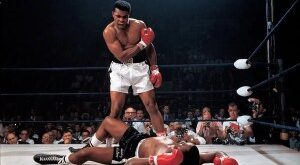This October 30 marks 51 years since one of the most legendary fights in boxing history — the one famously dubbed “The Rumble in the Jungle” by its flamboyant promoter Don King. The bout pitted two of the greatest heavyweights of all time: the charismatic and unmatched Muhammad Ali, and the fearsome knockout artist George Foreman. It was the first world title fight ever staged in Africa, taking place in Kinshasa, then the capital of Zaire (now the Democratic Republic of the Congo).
At 32 years old, the former champion Ali stepped into the ring to face the undefeated Foreman, who was seven years younger and came in with a record of 40 wins (37 KOs) and no defeats, holding the WBA and WBC heavyweight titles he had won by demolishing Joe Frazier in just two rounds in Kingston, Jamaica. Ali, meanwhile, entered with a record of 44-2 (31 KOs), his only losses coming against Frazier and Ken Norton.
For Ali, it wasn’t just another fight. It was a mission to reclaim the titles stripped from him after he refused to be drafted into the Vietnam War in 1967, citing religious and moral grounds as a conscientious objector — a decision that cost him his boxing license and kept him out of the sport for three and a half years.
By 1974, Ali had fought his way back to contention, though many saw Foreman as unbeatable. Oddsmakers made the champion a 7-to-1 favorite, and most experts predicted Ali wouldn’t last past the early rounds. But what unfolded that night — or rather, that early morning in Kinshasa — would forever change the narrative of boxing greatness.
The fight took place at Stade du 20 Mai, packed with over 60,000 roaring fans, most of whom chanted “Ali, bomaye!” (“Ali, kill him!”) from the opening bell to the final moment. The world watched in awe, as millions tuned in via pay-per-view. Though some reports exaggerated the numbers, calling it a billion viewers worldwide, there’s no denying it was one of the most-watched sporting events of the 20th century.
Ali’s Genius: Rope-a-Dope and Immortality
Against all odds — and even against his own trainer Angelo Dundee’s advice — Ali devised his own strategy: he leaned on the ropes, absorbed punches on his arms and shoulders, and let Foreman tire himself out. Between taunts like “Is that all you got, George?” and “You hit like a girl,” Ali’s mental warfare began to break the young champion’s rhythm.
For seven rounds, Ali endured the storm, employing what he would later call his “rope-a-dope” technique. Then, as round eight began, Ali saw his moment. He launched a quick, furious combination — four, five sharp shots — capped by a crushing right hand to the jaw. Foreman staggered, turned, and fell in slow motion, as if the laws of gravity had paused to witness history. Referee Zachary Clayton counted to ten at 2:58 of the eighth round, sealing one of the most stunning victories the sport had ever seen.
Muhammad Ali was once again the heavyweight champion of the world — and from that night forward, a legend beyond comparison.
The Legends Beyond the Ring
Both warriors have since left this world.
Ali retired in 1981 with a record of 56 wins (37 KOs), 5 losses, and was diagnosed with Parkinson’s disease three years later. He passed away on June 3, 2016, at age 74, in Scottsdale, Arizona. Beyond boxing, he became a global symbol of courage, faith, and activism, earning the Presidential Medal of Freedom, the Martin Luther King Award, and the title of Sportsman of the Century by both Sports Illustrated and the BBC.
Foreman, born in Marshall, Texas, in 1949, went through depression after the loss but later found redemption. He became a two-time world champion, a successful entrepreneur — famously with the George Foreman Grill — and a respected minister. He retired in 1997 with an impressive 76–5 (68 KOs) record. Foreman passed away on March 21, 2024, in Houston, Texas, at age 75.
Half a century later, The Rumble in the Jungle remains the benchmark for greatness in the sport — the night Muhammad Ali proved that genius, heart, and strategy could overcome raw power.
Source link
 Boxing News Boxing News
Boxing News Boxing News





